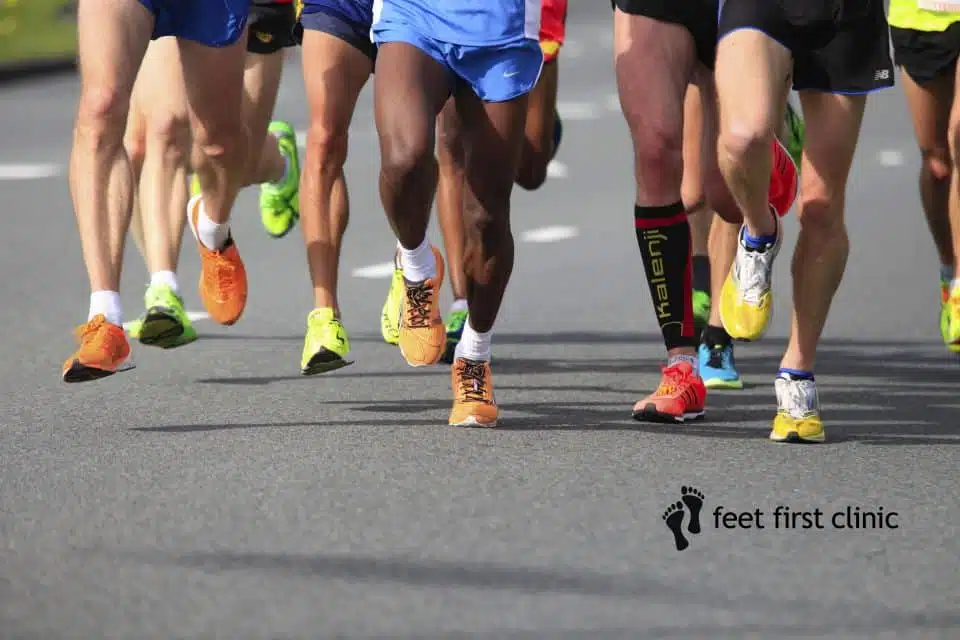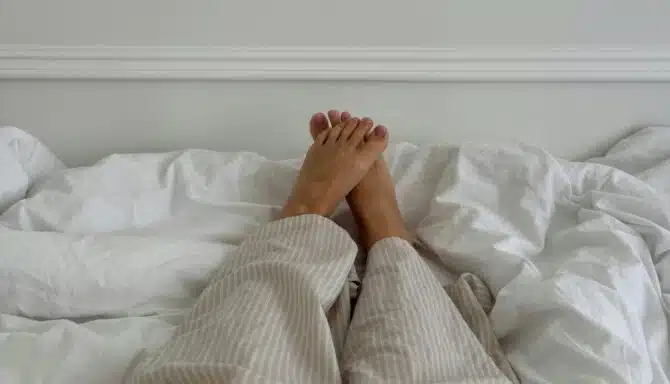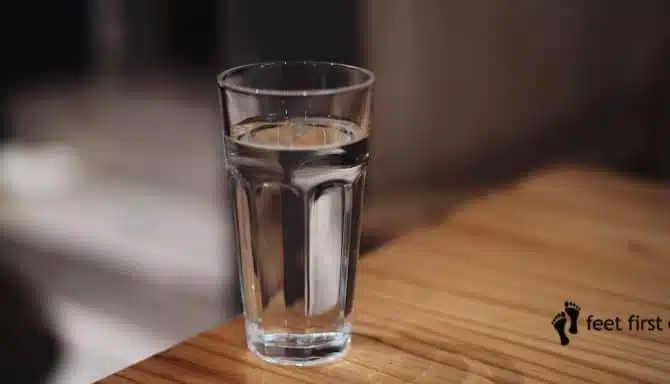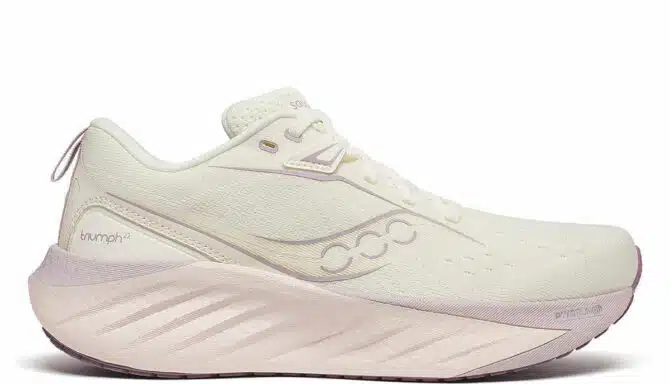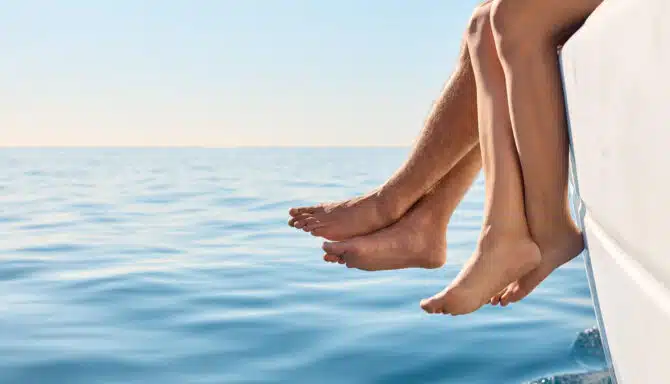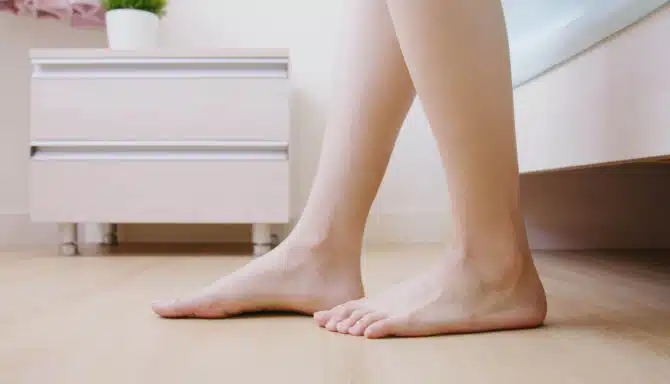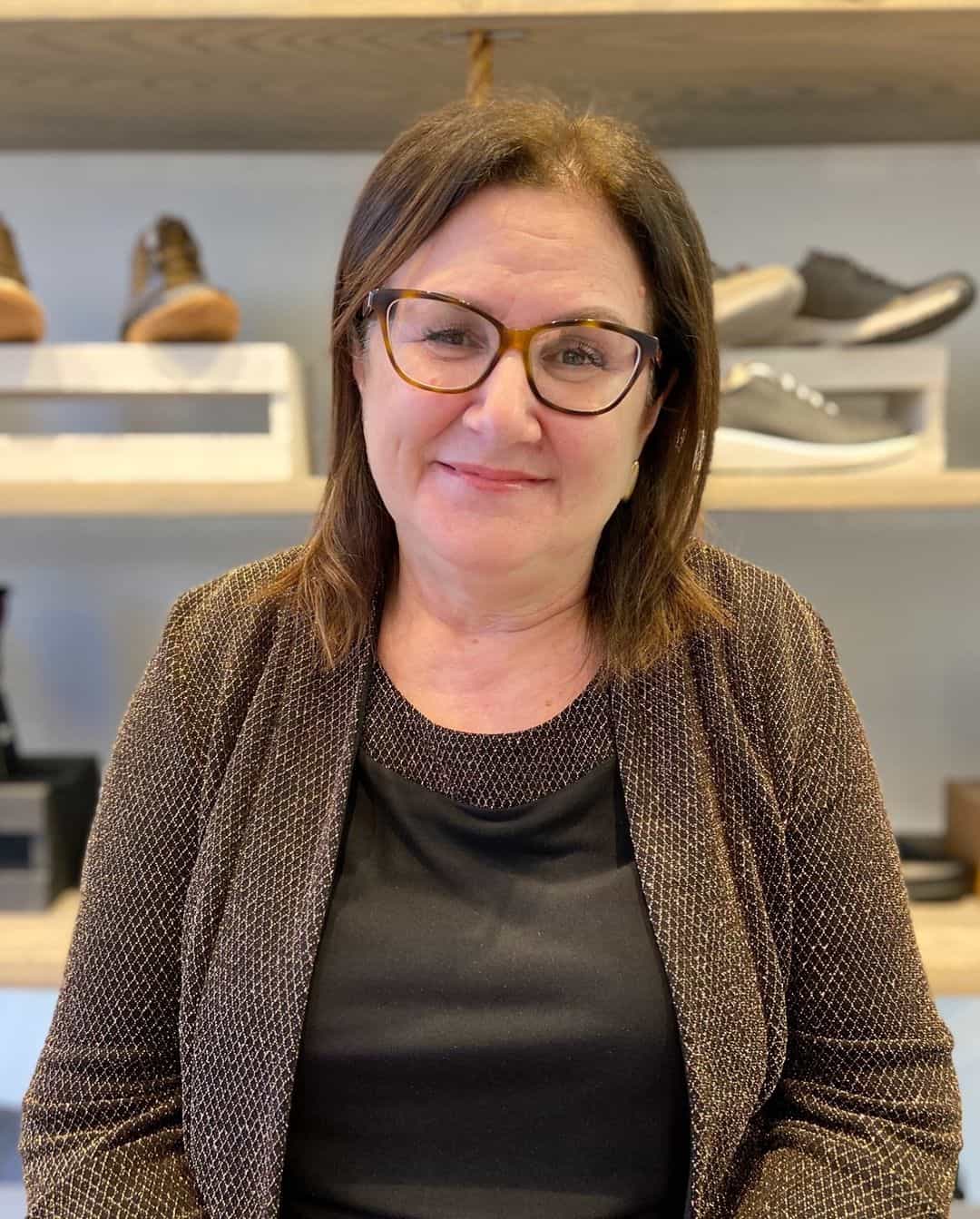Running is one of the best forms of exercise to improve health and life expectancy. It builds bone, muscle and cardiovascular strength. It is also good for us. The Mayo Clinic states “The great news is that you don’t have to run a marathon to benefit from exercise. Just getting out there and moving more helps.”
However, running also demands a lot of the body. It is one of the highest impact and intense forms of physical activity.
- When we run, our momentum generates a lot of force – up to 5 times our body weight.
- Each time our feet strike the ground, our weight-bearing joints have to absorb this force.
- The shock from this impact is felt in the feet and travels up our spine. This can cause stress and strain on the joints, which can lead to pain and injury over time.
As our body’s foundation, the feet play a crucial role in absorbing our body weight and force of impact when we run. They also keep us moving. So it’s important to make sure they’re protected, and there’s no better protection for your feet than shoes. Proper footwear can provide you stability and support to keep your body feeling its best. This will improve foot health and increase the longevity of your activity level as you age.
In this article, you’ll learn more about running shoes, their purpose, how to choose the right fit and whether it’s okay to run in non-running shoes.
Are Running Shoes Necessary?
Short Answer: Yes. As stated by Dr. Michael Scarcella, of the Cleveland Clinic: “Running shoes are the only protective equipment runners have to safeguard themselves from injury.” While they may not always make you run faster, they can help reduce pain and the repeated strain and stress of high-impact activity on the joints.
Typically, you wear footwear for each purpose. If you play tennis, you wear tennis shoes. If you golf, you wear golf shoes. The same goes for running. Although you can run in just about anything, wearing proper running footwear will help avoid injury and pain.
The way running footwear is constructed — a thicker heel to absorb impact and a heel-to-toe drop to match the natural gait cycle of running — is intended to complement the natural feel of your foot. Proper shoes should feel like an extension of your feet, just with the added proper protection.
Brands make many variations of shoes, called makes or models – just like car manufacturers. When you think of Toyota or Honda, you know they don’t just make one type of vehcile They make different vehicles for different uses: vans, sedans, SUVs, sports cars, off-road vehicles, and so on. Shoe brands do the same: they make various shoes for the type of runner you are. This means there is an ideal running shoe out there for you.
Do Running Shoes Really Make a Difference?

Yes, running shoes do actually make a difference.
- They are specifically made for running and the high-impact forces it generates.
- A snug fit means fewer foot issues, like blisters, while still giving you flexibility and comfort of movement.
- The structure helps ensure proper running form, which reduces the likelihood of joint strain.
- The build gives you longevity and the cushioning and material needed to withstand impact and repeated stress.
Don’t know how a running shoe should fit? Check out this article on how to choose the right running shoe fit for you.
Is It Bad To Run In Non-Running Shoes?
This can depend on the frequency and distance you run, as well as your running form. While some people may be accustomed to more minimal shoes, most experts recommend running shoes or sneakers. Frequently running in flat-soled shoes, like Converse, Vans, or dress shoes, can lead to soreness and pain over time. Even foot-friendly athletic walking shoes (while certainly better than Converse, Vans or dress shoes) aren’t ideal for running: walking shoes typically have less flexibility, cushioning and supportive features. Those shoes are not necessarily designed to go distance and have excessive forces applied to them.
However, running shoes are not the whole story:
Typically, your gait and biomechanics are more important than the shoes themselves. If you have poor biomechanics and running form, you may be injured regardless of the shoes you wear. Running and injuries aren’t mutually exclusive; in fact, people who do not run and are inactive tend to experience more injuries than runners. Many injuries traditionally thought to be solely running-related (like “runner’s knee”) are not so much related to running in-and-of itself, but rather to poor biomechanics and underlying health conditions (i.e.: pre-existing arthritis).
If you do have biomechanical abnormalities or a pre-existing foot condition, then a proper running shoe is more important: different types of running shoes are constructed specifically for different foot types and running gaits to encourage proper running form and reduce joint strain. An orthotic insole can also help minimise any biomechanical issues when you run.
That said, proper running shoes are only part of the solution: strengthening and conditioning our muscles in our legs and core-region is also essential for healthy biomechanics and injury prevention.
Are Running Shoes Good for Walking?
Walking shoes are generally heavier than running shoes. They’re built more for stability while running shoes are built for speed, faster movements and shock absorption. That said, running shoes can be suitable for walking, although this may wear out your running shoes quicker. If you walk a lot and continue to use the same pair of shoes to run, the shoes may break down faster.
But, picking the right shoes for walking can make it more enjoyable and comfortable. See a full lineup of proper walking footwear here at Feet First Clinic.
Which Running Shoe Should I Choose?

There is no perfect running shoe for everyone. It’s ultimately a personal preference. That said, there are certain decision points that can help you narrow down your choices.
- The surface you’re running on. Whether you run on sidewalks, gravel, grass, on a rubberized track, or on the beach, the type of surface changes your body’s needs. Your options include road running, trail running, or cross-training shoes.
- Your foot type. Shoes are categorized in three ways: neutral, stability, and motion control running shoes. The height of your arch and your pronation (the amount your ankle rolls inwards or outwards) influence your running gait. A proper foot assessment at Feet First Clinic will help you uncover your foot type.
- Health and Injuries: Different levels of cushioning and heel drop address different health concerns and injuries, like rheumatoid arthritis and Achilles tendonitis. They will also cater to your specific running gait, like whether you land more heavily on your midfoot or heel when you run. This can reduce pain and joint strain when running.
- Your budget. Running shoes typically retail for $100-$250 depending on the brand and model of shoe.
- Comfort. Ultimately your shoes should be comfortable. Ignore the looks, the brand, and the hype. Choose comfort over everything because this is your body.
There are even more factors to consider when choosing a shoe. Factors like how much you weigh, your muscular strengths, range of motion, balance, stride habits, efficiency, and speed makes choosing a shoe a personal preference. In fact, research by Calgary-based biomechanist Benno Nigg indicates that the best method for evaluating shoes may be whether they are comfortable for you. This research suggests that “a runner intuitively selects a comfortable product using their own comfort filter that allows them to remain in the preferred movement path. This may automatically reduce the injury risk and may explain why there does not seem to be a secular trend in running injury rates.”
How long should running shoes last?

In general, a pair of runners should last between 600-700 kilometers. After that, their effectiveness starts to decrease. Your feet might feel more sore and in a quicker time than what they used to. Depending on how much you run and the shoe’s build, shoes can last a few weeks, months or even years. Check the midsoles regularly for wrinkles and signs of uneven wear and breakdown. If you experience new aches and pains, it may also be a sign that your shoes are ready for replacement.
Your one-stop-shop for footwear
All under one roof! Our team handles any and all your foot health concerns. From mild to severe, we cover all sides of the foot needs spectrum. Call us at 416-769-3338 or Book Your Assessment Today!
